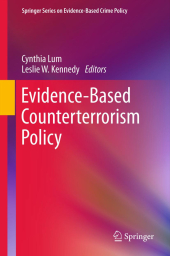 Neuerscheinungen 2014Stand: 2020-02-01 |
Schnellsuche
ISBN/Stichwort/Autor
|
Herderstraße 10
10625 Berlin
Tel.: 030 315 714 16
Fax 030 315 714 14
info@buchspektrum.de |

Leslie W. Kennedy, Cynthia Lum
(Beteiligte)
Evidence-Based Counterterrorism Policy
Herausgegeben von Lum, Cynthia; Kennedy, Leslie W.
2012. 2014. viii, 388 S. 25 Tabellen. 235 mm
Verlag/Jahr: SPRINGER, BERLIN; SPRINGER NEW YORK 2014
ISBN: 1-493-90111-7 (1493901117)
Neue ISBN: 978-1-493-90111-1 (9781493901111)
Preis und Lieferzeit: Bitte klicken
This volume emphasizes the need for empirical research that evaluates government spending on terrorist intervention. The text focuses on evidence-based questions on the effectiveness of policies and whether secondary effects exist.
In the past eight years, there has been a massive increase in government spending on counterterrorism intervention development and implementation. Given this increase, there are two evidence-based policy questions that are important to address:
Is there evidence that any of these programs are effective - in other words, can they be shown to be linked to reducing terrorism, terrorist recruiting, or to improving the response and management of terrorist events?
Do these interventions have secondary or collateral effects that may be costly, harmful, illegal, beneficial, or otherwise?
As Lum and Kennedy discovered in an evaluation research on counterterrorism interventions, only a minuscule number of empirical studies of terrorism exist and there is an almost complete absence of evaluation research on counter-terrorism strategies. This is startling given the enormous increases in the development and use of counter-terrorism programs, as well as spending on counter-terrorism activity. Even more disconcerting was the nature of the evaluations we did find; some programs were shown to either have no discernible effect on terrorism or lead to increases in terrorism. The emphasis of the need for empirical research in evaluating interventions and informing policy cannot be overstated, and is the primary goal of Evidence-Based Counterterrorism Policy .
Preface: Evidence-based policy movement.- A. Introduction.- 1. Evidence Based Counter Terrorism Policy: Issues and Prospects.- B. Obtaining Data for Counterterrorism Evaluations.- 2. Generating Evidence - A Review of Projects from the START Center .- 3. Data Archives for Terrorism Research.- 4. The Role of Fusion Centers as Sources of Information .- 5. Data from courts and prisons.- 6. Dynamic Data Analysis and Data Mining.- C. Methodological Concerns in Evaluating Counterterrorism Policy.- 7. Methodological Challenges of Evaluation: The Qualitative Critique of the Campbell Review.- 8. Quantitative Methods in Evaluating Counterterrorism policy.- 9. Longitudinal Methods of Evaluation: Hazard Modeling and Trajectory Analysis.- 10. Alternative Methods of Evaluation - Advanced Events Data Analysis and Simulations


